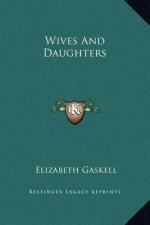’That’s capital, Gibson! what good wind blew you here? You’ll have some lunch? it’s on the table, I only just this minute left the room.’ And he kept shaking Mr. Gibson’s hand all the time till he had placed him, nothing loth, at the well-covered dining-table.
‘What’s this I hear about Roger?’ said Mr. Gibson, plunging at once into the subject.
’Aha! so you’ve heard, have you? It’s famous, is it not? He’s a boy to be proud of, is old Roger. Steady Roger; we used to think him slow, but it seems to me that slow and sure wins the race. But tell me; what have you heard? how much is known? Nay, you must have a glass full. It’s old ale, such as we don’t brew now-a-days; it’s as old as Osborne. We brewed it that autumn and we called it the young squire’s ale. I thought to have tapped it on his marriage, but I don’t know when that will come to pass, so we’ve tapped it now in Roger’s honour.’
The old squire had evidently been enjoying the young squire’s ale to the verge of prudence. It was indeed as he said, ‘as strong as brandy,’ and Mr. Gibson had to sip it very carefully as he ate his cold roast beef.
’Well! and what have you heard? There’s a deal to hear, and all good news, though I shall miss the lad, I know that.’
‘I did not know it was settled; I only heard that it was in progress.’
’Well, it was only in progress, as you call it, till last Tuesday. He never let me know anything about it, though; he says he thought I might be fidgety with thinking of the pros and cons. So I never knew a word on’t till I had a letter from my Lord Hollingford—where is it?’ pulling out a great black leathern receptacle for all manner of papers. And putting on his spectacles, he read aloud their headings.
’"Measurement of timber, new railings,” “drench for cows, from Farmer Hayes,” “Dobson’s accounts,”—’um ’um—here it is. Now read that letter,’ handing it to Mr. Gibson.
It was a manly, feeling, sensible letter, explaining to the old father in very simple language the services which were demanded by the terms of the will to which he and two or three others were trustees; the liberal allowance for expenses, the still more liberal reward for performance, which had tempted several men of considerable renown to offer themselves as candidates for the appointment. Lord Hollingford then went on to say that, having seen a good deal of Roger lately,




